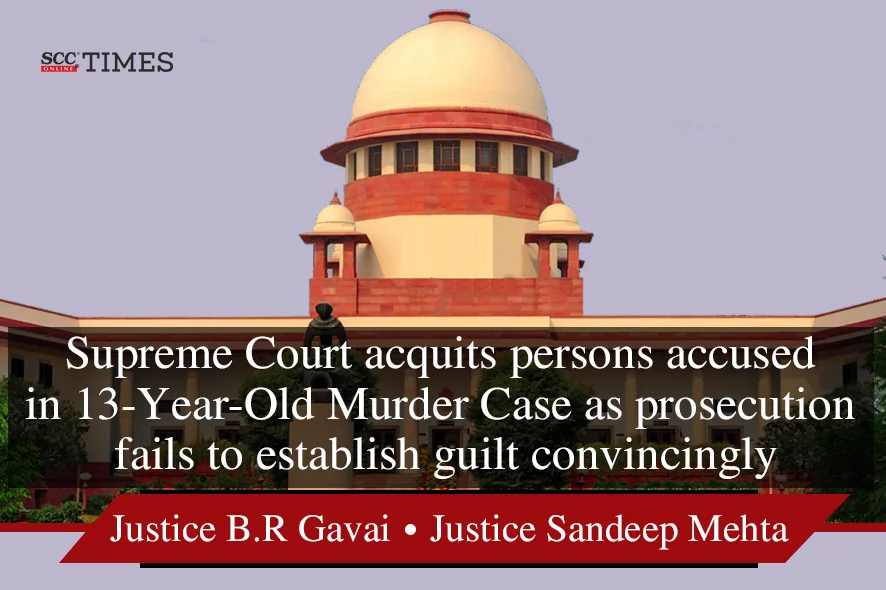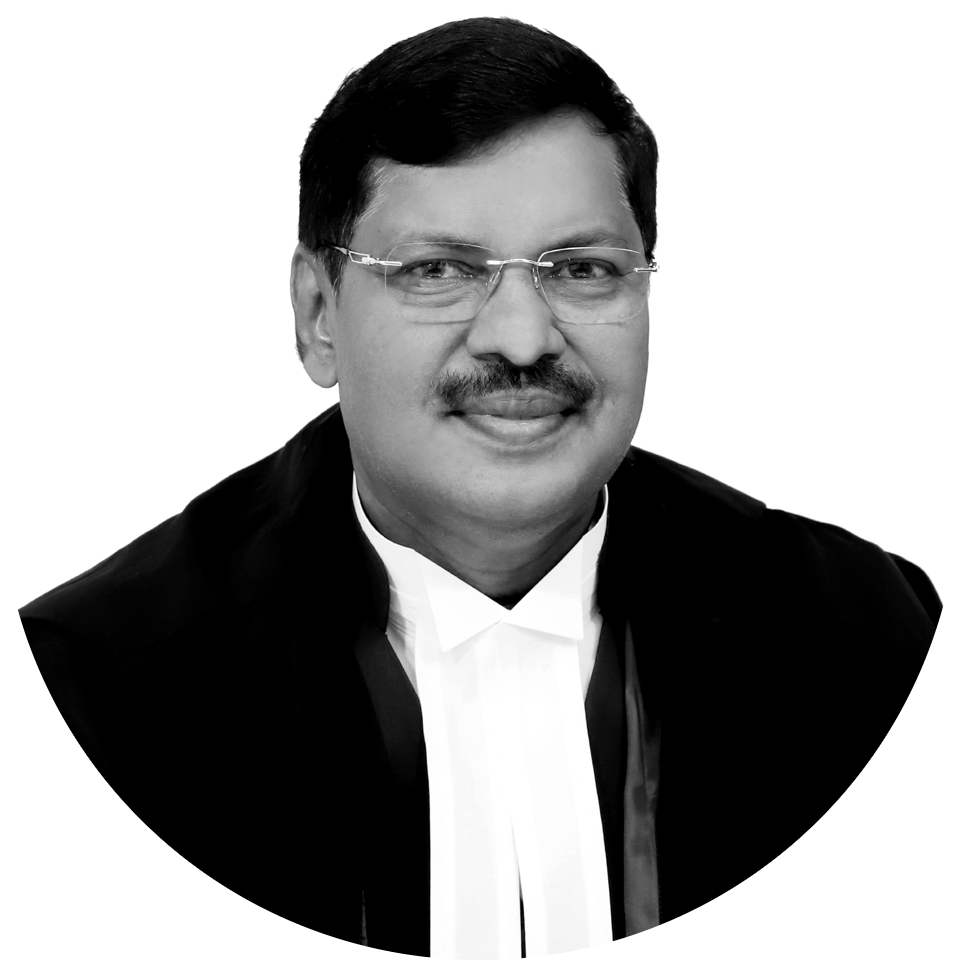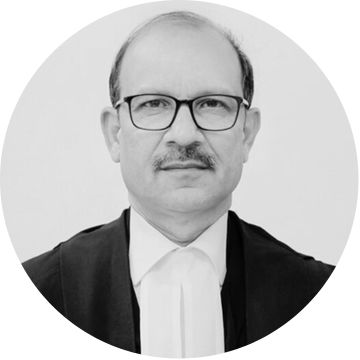Supreme Court: While considering the instant appeals challenging the impugned judgments of Trial Court and Gujarat High Court convicting the accused persons under Section 3021 read with Section 120-B2 of Penal Code, 1860 (IPC); the Division Bench of B.R Gavai and Sandeep Mehta*, JJ., acquitted the accused of all charges holding that the prosecution failed to lead convincing evidence establishing the guilt of the accused persons beyond all manner of doubt to hold them responsible for the crime. Therefore, the Court decided that the accused persons deserve to be acquitted by giving them the benefit of doubt.
Background and Legal Trajectory: A dispute regarding supply of water in the residential blocks of New Memon Colony, Bhalej Road, Anand, turned into an altercation, which in turn resulted into indiscriminate assault with sharp edged weapons by the accused persons. The victim who had sustained injuries on his head and chest regions, was shifted to a hospital, where he was declared dead.
This led to the filing of a complaint by the first cousin of the deceased victim and the police began their investigation. The accused persons were arrested 5 days after the date of the incident. After conclusion of the investigation, a charge sheet was filed against the accused persons for offences punishable under Sections 302, 3233 and 120-B IPC.
The matter came before Court of Additional Sessions Judge, Anand (Trial Court), as the accused persons pleaded not guilty and claimed trial. The Trial Court upon appreciation of evidence presented by the prosecution, convicted and sentenced the accused persons under Ss. 302 and 120-B of IPC and sentenced them to imprisonment for life with fine of Rs. 1,000 each, in default whereof, to undergo rigorous imprisonment for three months. However, they were acquitted of the charge for offence under S. 323, IPC.
The Division Bench of Gujarat High Court affirmed the conviction and sentence imposed by the Trial Court. Aggrieved, the accused persons came to the Supreme Court.
Counsel for the accused persons pointed out several discrepancies such deliberated concealment of statements by the prosecution, failure to produce corresponding diary duty, thereby warranting an adverse inference.
Court’s Assessment:
Perusing the facts of the case, the Court expressed its surprise that that a police constable had seen the incident and had also brought the crime weapons to the police station and yet his statement was not recorded and the factum of presentation of weapons was not entered in the daily diary of the police station. The Court pointed out that this omission creates a reasonable doubt. The Court further pointed out that non-production of the daily diary was a serious omission on part of the prosecution.
The Court stated that the first version of events narrated by the police constable in the instant case would be treated as the FIR. The Court found the prosecution to be guilty of concealing the initial version from the Court. Furthermore, the Court pointed out there was a cloud of suspicion on the prosecution case’s threshold, i.e. the time and manner of lodging of the FIR.
The Court also relied on State of A.P. v. Punati Ramulu, 1994 Supp (1) SCC 590, wherein it was stated that when the police officer does not deliberately record the FIR on receipt of information about cognizable offence and the FIR is prepared after reaching the spot after due deliberations, consultations and discussion, then such a complaint cannot be treated as FIR and it would be a statement made during the investigation of a case and is hit by Section 162 CrPC4.
The Court took note of a key prosecution witness, PW- 12 being made to identify the accused persons in the dock and pointed out that the attempt by the prosecution witness to make dock identification of the accused after nearly two and a half years of the incident was flimsy and unacceptable. “The witness had not given out either the names or the description of the features of the accused in his police statement and thus, if the prosecution was desirous of getting the accused identified at the hands of this witness, then he should have been made to identify the accused persons in a Test Identification Parade during the investigation. Thus, the identification of the accused by PW- 12 for the first time in the dock is totally unbelievable and unacceptable”.
Taking note of the confessions of the accused persons recorded by the Medical Officer while preparing their injury reports, the Court found these “so-called confessions” to be ex-facie inadmissible. The Court said that the notings made by the Medical Officer in the injury reports of the accused persons would clearly be hit by Section 265 of the Evidence Act, 1872.
The Court also noted the inconsistencies in the statements made by the prosecution witnesses, hence creating a reasonable doubt in the mind of the Court. Furthermore, non-examination of independent witnesses which were material witness for unfurling a true picture of the story, created further doubt on the truthfulness of the prosecution case.
The Court was of the firm view that neither the disclosure statements made by the accused were proved as per law nor the same resulted into any discovery which could be accepted as incriminating inasmuch as the requisite link evidence was never presented by the prosecution to establish that the recovered articles remained in the self-safe condition from the date of the seizure till the same reached the FSL.
Concluding its analysis, it was observed that while exercising jurisdiction under Article 136 of the Constitution, the Court does not interfere with the concurrent findings recorded by the courts below. However, where the evidence has not been properly appreciated, material aspects have been ignored and the findings are perverse, the Court would certainly interfere with the findings of the courts below.
Allowing the instant appeals, the Court set aside the impugned judgments of the Trial Court and Gujarat High Court and acquitted the accused persons.
CASE DETAILS
|
Citation: Appellants : Respondents : |
Advocates who appeared in this case Appellant-accused: Respondent: |
CORAM :
Buy Constitution of India HERE
Buy Penal Code, 1860 HERE
Buy Code of Criminal Procedure, 1973 HERE
1. Section 103, Nyaya Sanhita, 2023 (BNS)
4. Section 181, Nagarik Suraksha Sanhita, 2023 (BNSS)
5. Section 23(2), Sakshya Adhiniyam, 2023











